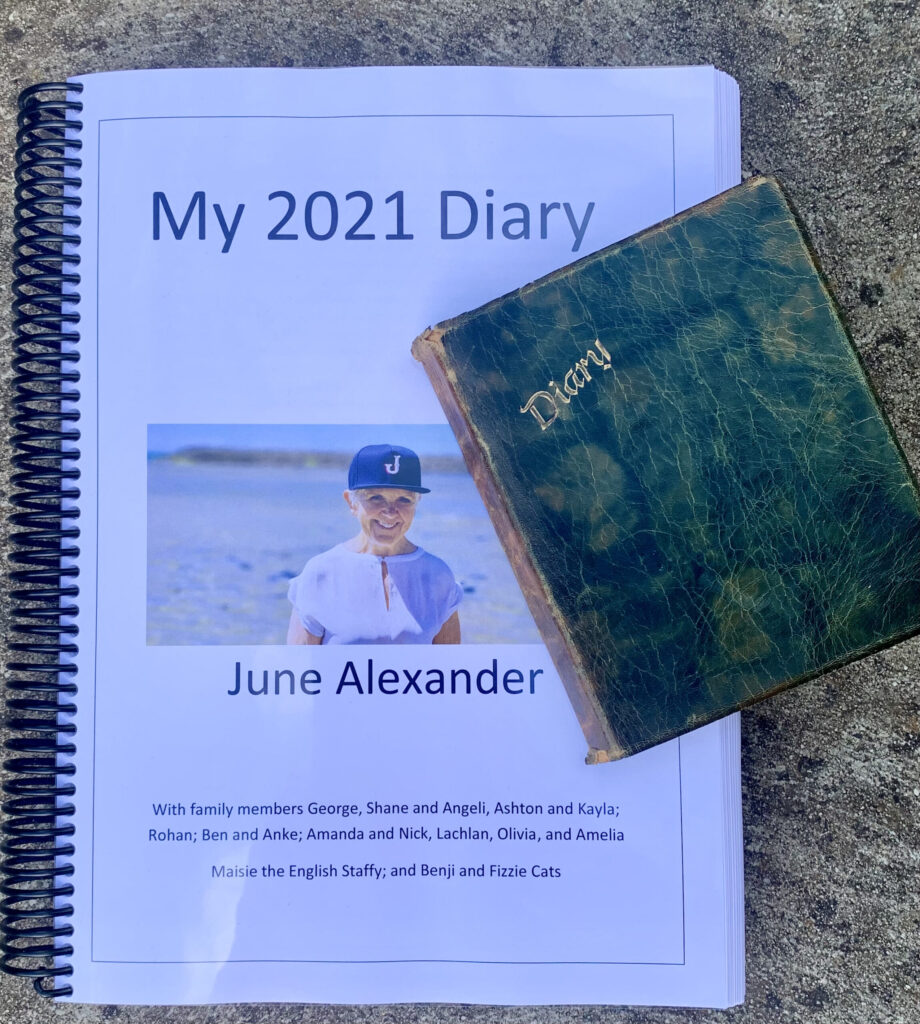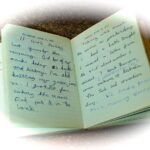Sixty years on, my diary has evolved from a private survival tool to an open family record

Sixty years on, my diary has evolved from a private survival tool to an open family record
In 1962, when undiagnosed anorexia nervosa ravaged my 11-year-old mind and body, a small miracle occurred. A Christmas gift of a diary sparked a lifelong passion. A bond of trust and friendship was forged immediately with that little diary. I began writing in it that very day. Sixty years on, in 2022, I continue to keep a diary. Writing a diary has been instrumental in my survival, self-healing, and continued self-growth. My diary has recorded many ups and downs, and documented plenty of challenges, including sabotage by my eating disorder, but together we have weathered the test of time. The 60 diaries lining the bookcase in my writing room are testament to this.
Sixty years is a good time to pause and reflect on how the diary has shaped my life. One major change is that for years my diaries were strictly private and personal. Look out for anyone who read my diary without permission. Today the diaries are no longer hidden; they are not only part of my life, but of my family.
 At age 11, I did not know anyone who kept a diary. At my small, one-room, one teacher primary school I had read about Englishman, Samuel Peppys, who kept a diary some 300 years earlier. Peppys was special because he recorded personal observations of daily life as well as describing major events such as the Great Fire of London and an outbreak of the bubonic plague. Peppys’ way of writing definitely connected with me.
At age 11, I did not know anyone who kept a diary. At my small, one-room, one teacher primary school I had read about Englishman, Samuel Peppys, who kept a diary some 300 years earlier. Peppys was special because he recorded personal observations of daily life as well as describing major events such as the Great Fire of London and an outbreak of the bubonic plague. Peppys’ way of writing definitely connected with me.
My diaries have evolved in a similar fashion. Initially the daily observations were of a mostly “I did this” and somebody else “did that” nature, but in my teenage years, more emotion and self-reflection began to appear.
Lost in the forest of the eating disorder
Unlike Peppys, however, my diary was shared with an eating disorder. The anorexia was prominent on the very first page of my first diary. The evidence was there, clear as day, but unfortunately, there was nobody with knowledge or expertise to read it. The inner focus intensified, with entries recording details of food consumed and time spent exercising. As I entered adolescence and young adulthood, the pages became filled with self-imposed rules and regulations aimed at fruitless attempts to manage anxiety by meeting the unrelenting demands of the eating disorder.
The diaries through the 1970s recorded marriage, road trauma, births of babies, moving house, being a working mother, becoming suicidal and eventually, for the first time, in my late 20s, approaching a doctor for help. Years of misdiagnosis and struggle followed.
In my 30s, throughout the 1980s, the pages documented moving from the country to the city in the search for a correct diagnosis and treatment. Besides adjusting to suburban life, the diary observed my efforts with adapting to a new job, the early years of the recovery journey, the struggles, and impacts of, new and sometimes dangerous medications; and marriage breakdown. The one common theme was struggle, struggle, struggle.
Transition to recognition of true self
 The 1990s was more of the same, but with a gradual transition to recognition of true self, and less dominance by the eating disorder. More medications, more relationship challenges, more confusion about self-identity ensued. Indeed, my 30s and 40s were largely lost in the dark, thick forest that was my eating disorder. Finding a path out of this forest was all-consuming. Several operations, including a hysterectomy and the insertion of a titanium rod in my cervical spine (to alleviate the impact of road trauma at age 20), were positives. Major negatives included the sudden death of my brother-in-law and the revelation that my parents knew about the rapes that had occurred in my early childhood and yet still welcomed the perpetrator, a cousin, into their home.
The 1990s was more of the same, but with a gradual transition to recognition of true self, and less dominance by the eating disorder. More medications, more relationship challenges, more confusion about self-identity ensued. Indeed, my 30s and 40s were largely lost in the dark, thick forest that was my eating disorder. Finding a path out of this forest was all-consuming. Several operations, including a hysterectomy and the insertion of a titanium rod in my cervical spine (to alleviate the impact of road trauma at age 20), were positives. Major negatives included the sudden death of my brother-in-law and the revelation that my parents knew about the rapes that had occurred in my early childhood and yet still welcomed the perpetrator, a cousin, into their home.
Turning 50 in the year 2000 marked a new century and a new decade. By now the recovery work accomplished with my trusted and patient treatment team in the previous 15 years had set the foundation for accelerated self-growth.
The diaries recorded the diagnosis and treatment of Hashimoto’s Disease; the removal of my thyroid; and a move from the city back to country life. They documented painful emotions associated with the discovery of more family-of-origin secrets, of increasing alienation and exclusion. Efforts to encourage family healing were ignored and alienation from my family of origin became complete.
Diaries a major resource for memoir
In 2006, under careful and prolonged supervision from my psychiatrist, I eased off all depression and anxiety medications that had been part of my daily intake for more than 20 years. Shortly after, I ceased full-time work and my diaries became a major resource in fulfilling a long-held dream of writing my memoir. I also established a website to accompany the public release of my inner story. By now, the diaries were a practise and exploration ground for healthy-me, and eating-disorder-me faded away.
A Girl Called Tim marked a major step forward in “coming out” as my true self, and establishing my identity, separate from the eating disorder. My Kid is Back, and other books, quickly followed.
My children were getting married, the first of five grandchildren arrived and my parents died. I was living more authentically but had a lot to learn – about myself, and about interpersonal relationships. Making mistakes provided opportunity for discarding people or experiences that did not fit my healthy-self-identity, and for absorbing those that did belong.
Becoming 60, was like rounding a corner after many twists and turns and finding a smooth, straight road. Life became an adventure, something like a magic-carpet ride. Beautiful. This was a period of self-discovery, adjustment to freedom, and payback to the eating disorder through raising awareness and assuring those with the illness that they are not alone. Books were written and PhD (researching the diary and the benefits of writing in eating disorder recovery) completed.
Being imperfect is perfectly okay
At 71, I continue to be busy, catching up on life, MY life. My children and grandchildren know I am not perfect and that is perfectly okay to me. I am an open book. No secrets. My experience is that family secrets lead to misunderstandings and ultimately, pain. My diary, like me, continues to evolve. It has transitioned from a hand-written hard copy to an online format that is stored in a “Do Not Delete!” folder on my computer and is also printed at the end of each year. In line with my emphasis on transparency, the diary has transitioned from private to open. The personal factor remains, but rather than an inward focus, evident during the decades of struggle with the eating disorder, the focus is all-embracing. Recovery has enabled my inner story and outer story to synchronise and become one. Today’s diary reflects this. The diaries, in recording my challenging search to recover a self that was overtaken by anorexia in childhood, have allowed me to place the illness in the context of my life, to grieve for the little girl lost, and most importantly to take that little girl by the hand and bring her into the present.
From private to family diary
 Today’s diaries are all inclusive. For instance, inner conversations are complemented with text conversations with children, grandchildren and friends. Letters, cards, poems, photographs, blogs, and more are part of my daily observations and documentation.
Today’s diaries are all inclusive. For instance, inner conversations are complemented with text conversations with children, grandchildren and friends. Letters, cards, poems, photographs, blogs, and more are part of my daily observations and documentation.
I print one copy of the online diary at the end of each year. My 2021 diary contains 601 pages featuring many colour prints of family activities. The print cost was expensive but to me the diary is priceless. I think of it as my family diary. (The picture accompanying this story shows the 2021 diary with my first diary, which I began to write, 60 years previously).
For many good reasons, I encourage you to write a diary. If you haven’t started already, grab and notebook and pen, write the date, and begin today!





